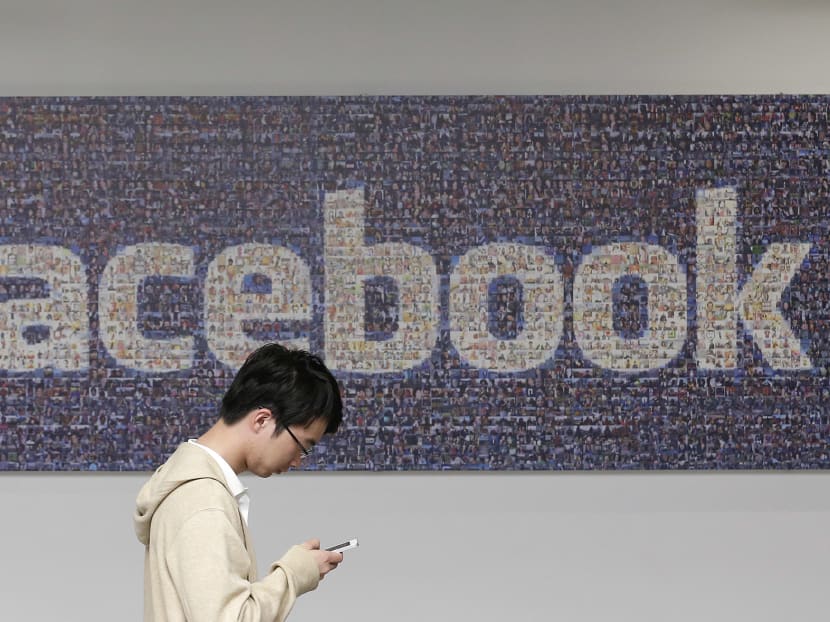Facebook’s ambitious plan for Messenger: Make phone calls, and even apps, obsolete
LOS ANGELES — Facebook’s Messenger now has 900 million monthly active users, and the company just took one of Snapchat’s key features to make it easier for these users to talk to each other: Messenger now supports custom QR codes similar to the ones used by Snapchat to allow users to link up and start conversations. “Phone numbers aren’t necessary, and you don’t have to be friends on Facebook,” the company declared in a blog post.

AP file photo
LOS ANGELES — Facebook’s Messenger now has 900 million monthly active users, and the company just took one of Snapchat’s key features to make it easier for these users to talk to each other: Messenger now supports custom QR codes similar to the ones used by Snapchat to allow users to link up and start conversations. “Phone numbers aren’t necessary, and you don’t have to be friends on Facebook,” the company declared in a blog post.
In addition, Facebook also rolled out new Messenger usernames and links for businesses and individuals, something the company also pitched as a way to avoid the Yellow Pages: “Since traditional phone books are almost obsolete, we’re making it easier for you to find the people (and businesses) that matter to you and be able to start conversations immediately.”
Those constant references to yesteryear’s phone books are no accident: Facebook aims to not just get more people to chat, but also change how we use our phones, and turn Messenger into a centrepiece of that change. The goal is to make phone numbers, phone calls and even many apps on our phones obsolete, and replace them with Messenger conversations — something that should matter to anyone trying to talk to their customers, whether it’s a local restaurant trying to take reservations or a cable company aiming to retain its customers.
THE FACEBOOK PHONE THAT WASN’T
This isn’t the first time Facebook is trying to take more ownership over people’s phones. For a long time, the company was looking to launch its own line of Android-based phones to more directly compete with Google and Apple. After years of rumours, Facebook launched a smartphone in cooperation with HTC three years ago: The HTC First came with a Facebook-optimised home screen that put newsfeed status updates front and centre, while hiding apps from competitors.
The effort flopped, in part because of the phone’s cheap hardware, which couldn’t compete with more premium devices from Samsung and Apple. But many consumers also seemed perfectly fine with the original Facebook app on their phone, and didn’t feel a need to let see random photos from high school friends on their phone’s home screen. Operator partner AT&T put the First on sale just a month after its launch, and Facebook soon after abandoned the initiative altogether.
THE RISE OF MESSENGER
However, soon after, another Facebook product rose to become a mobile hit: Messenger had reached 200 million monthly active users when Facebook decided to spin it out of its main app in April 2014. By November of that year, Messenger’s user base had more than doubled to reach 500 million monthly actives, only to continue its growth toward this week’s 900 million user milestone.
In response, Facebook decided to double down on Messenger, adding features like voice and video calling and eventually integrating third-party apps and services, including those from media partners like ESPN, JibJab and Bad Robot.
At its F8 Developer Conference in March 2015, Facebook also announced that it was starting to open Messenger to select businesses, allowing consumers to directly communicate with companies over the platform. Participating companies make use of existing customer service tools from companies like Zendesk to directly field requests from consumers, giving them a way to avoid automated calling systems as well as being on hold while waiting for that always-elusive next available representative.
QR CODES, CHAT BOTS AND COMMERCE WITHOUT APPS
That strategy seems to be working, both for participating companies as well as Facebook itself: The social-networking giant revealed Thursday (April 7) that Messenger users already send more than 1 billion messages every month to businesses and Facebook page owners.
This number is likely going to skyrocket with Thursday’s introduction of usernames, links and QR codes. For one thing, consumers can now simply message any brand that already has a Facebook page directly from within Messenger. But stores and brands can also add their custom QR code to packaging, storefronts, outdoor advertising and even websites to quickly spark a conversation with consumers.
Facebook won’t just host all of those conversations, and in turn become the centre of much of the communication on people’s phones. The company is also looking to make conversations themselves smarter and more scaleable by using a mixture of humans and artificial intelligence to field requests from users. The company has already been testing this approach with its own personal assistant, a project dubbed “M,” and is widely expected to make similar tools available to developers at its F8 conference in San Francisco next week.
Additional smarts and automated interactivity could also open the door for another frontier: commerce, right within Messenger. Instead of opening up a separate app to buy a movie ticket, users may just ask a chat bot to find a theatre near them, and then buy the tickets of their choosing.
In this future, Facebook will be in charge of much of what you’ll be doing with your phone — without the need to sell a single phone. VARIETY.COM/REUTERS





